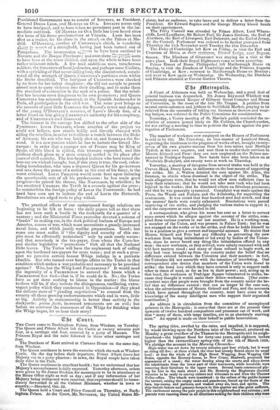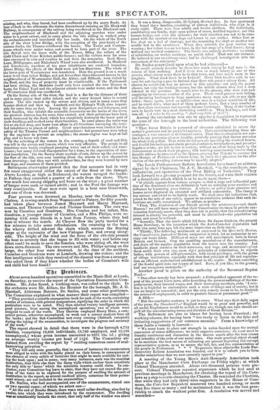int Attrapotio.
A Court of Aldermen was held on Wednesday, and a good deal of general business was despatched. Mr. James Raymond Whithair was unanimously appointed Keeper of Giltsptir Street Compter and House of Correction, in the room of the late Mr. Teague. A petition from several cattle-salesmen and jobbers in Smithfield Market, praying to be relieved from the necessity of taking out licences as drovers and wear- ing badges, was referred to the Police Committee for consideration.
Yesterday, a Vestry meeting of St. Martin's parish rescinded the re- solution of censure passed lately on Mr. Cobbett, the Churchwarden, for not calling a meeting in time to petition the Queen against the pro- rogation of Parliament.
The number of workmen now employed on the Houses of Parliament is said to be 160. Mr. Crawshay, an iron-master of Lombard Street, regretting the hindrance to the progress of works of art, brought twenty- seven of his own granite-masons from his iron-mines near Merthyr Tydvil, at his own expense, and sent them to tender their services to Messrs. Grissell and Peto: they are now employed on the Nelson mo- nument in Trafalgar Square. New hands have also been taken on at Woolwich Dockyard, and twenty were at work on Thursday. Yesterday, a meeting of delegates from several trades was held at the- Craven Head, Drury Lane, to deliberate on the best means of supporting the strike. Mr. A. Walton detailed the case against Mr. Allen, the foreman, to obtain whose dismissal is the ottject of the strike. The main allegations were, that he would not allow men sufficient time to bury their relations; that he would not take men back who had been injured in the works; that he dismissed others on frivolous pretences; and that he was generally tyrannical. Complaint was made against the Press, the Woods and Forests, and the Admiralty, for supporting the contractors. It was stated that four hundred men had struck, and that the masons' funds were nearly exhausted. Resolutions were passed approving of the strike, and pledging the various trades to support it ; and the carpenters at once handed in 20/.
A correspondent, who gives his name has sent us a letter to correct some errors which he alleges against the account of the strike, com- piled from various sources in our last number. He is a working-mart, a member of the Union and was present in Palace Yard ; but he was. not engaged on the work; or in the strike, and thus he holds himself to in a position to give a correct and impartial account. He denies that Messrs. Grissell and Peto had any difficulty in preventing the new workmen from being intimidated or led away by bodies of the Union- ists, since he never heard any thing like intimidation offered to any man : the new workmen, as they arrived, were calmly reasoned with and' told how matters stood ; and many of them refused to begin work, as- they had been brought up from the country under the belief that no difference existed between the Unionists and their masters : in fact, the Unionists did not assemble with the intention of interfering. Our correspondent also denies that members of the Union were bound to strike : the bond into which they have entered is only to support each other in times of need, as far as lies in their power ; and, acting up to that bond, the workmen at Trafalgar Square volunteered to strike, be- cause they thought it would assist their fellow-workmen. [Our corre- spondent says that people were brought from the country under the be- lief that no difference existed : that can no longer be the case now, when the advertisements of Messrs. Grissell and Peto, and the accounts which have spread throughout the country, must have come to the knowledge of the many intelligent men who support their organized combination.]
An address is in circulation from the committee of unemployed printers in the Metropolis : it states that there are at the present time upwards of twelve hundred compositors and pressman out of work, and that "many of them, with large families, are in an absolutely starving state." An appeal is made on their behalf to public benevolence.
The spring tides, swelled by the rains, and impelled, it is supposed, by winds blowing upon the Northern inlet of the Channel, produced on Monday a great overflow of the Thames in the Metropolis and its neigh- bourhood—the highest flood for forty-one years, and eighteen inches higher than the extraordinary spring-tide of the 5th of March 1828. We abridge the account in the Morning Chronicle- fligh-water was set down for twenty minutes past four o'clock, but it went on rising till five : at three o'clock the river had already flowed above its usual level : at four the whole of the High Street Wapping, from Wapping Old Stairs, opposite the Rectory-house, to New Crane, Shadwell, presented the appearance of a canal ; the water flowing along the courts and alleys drove the inhabitants from the lower part of their tenements, while hundreds were removing their furniture to the upper rooms. Several boats commenced ply- ing for hire in the main street ; and Mr. Broderip the Magistrate directed wherries to be ready to convey suitors and witnesses to and from the Thames Police-office. The wharfs were inundated : in the cellars of the public-houses the torrent, raising the empty casks and puncheons, forced up the floors of the bars, tap-rooms, and parlours, and washed away ale, beer, and spirits. The ship-biscuit-bakers and granary-keepers in this quarter are also great sufferers. The excitement among the poor people in this neighbourhood was extreme ; and parents were running about in all directions seeking for their children who were missing, and who, they feared, had been swallowed up by the angry floods. At four o'clock in the afternoon the trains discontinued running on the Blackwall Railway, in consequence of the railway being overflowed at the Blackwell end. The neighbourhood of Blackwell and the adjoining marshes were under water to a great extent, and in many places the tide rolling in washed away the embankments and inundated the low lands. On the whole of the North side of the river below Bridge, with the exception of the pier-heads of the various docks, the Thames overflowed the banks. The Tower and Custom- home wharfs were under water, and seemed to form part of the river. The tide flowed into the inner walls of the Tower, filling the cellars of the Gold Chain and Stone Kitchen public-houses ; and the miters were for some time conveyed in cabs and coaches to and from the armouries. Dark House Lane, Billingsgate, and Nicholson's Wharf were also overflowed. In Shadwell and Limehouse, numbers of the poor inhabitants are rendered houseless. Above Bridge the effects of the flood were not less disastrous. The whole of the lower part of Westminster was inundated. Here the ground is on a much lower level than below Bridge, and not fewer than three thousand houses in the neighbourhood of Westminster Hall, the Abbey, and Milbank, were visited by the flood, and the loss of property must be considerable. If the Parliament had been sitting, the Members could only have reached the two Houses in boats, for Palace Yard and the adjacent streets were under water, and the floor of Westminster Hall was overflowed.
On the Surrey side of the river, the land is a flat for the distance of three and in some places four miles inland, and the water formed lakes in several places. The tide rushed up the sewers and sluices, and in many cases they became choked and blew up. Lambeth and the Bishop's Walk were impass- able for some time on foot. Among the poor dredgermen and fishermen, and their families, who inhabit the miserable tenements on the banks of the river, the greatest distress has for some time existed, and their privations have been much increased by the flood, which has completely destroyed the lower part of their dwellings and washed away their furniture. In some places the water was five or six feet deep, and boats were afloat in all directions conveying the terri- fied inhabitants to places of safety. Great apprehensions were created for the safety of the Thames Tunnel and neighbourhood: but precautions were taken by the engineer to prevent an eruption ; the steam-engine was kept at full play, and no harm was done. On the subsiding of the waters in the evening, a deposit of mud and filth was left in the streets and houses, which was very offensive. The people in all directions were busily employed plumping water out of their cellars and ware- houses; but many deferred this operation for a time, in the expectation of ano- ther inundation. On the Surrey shore myriads of rats, driven up the sewers by the flow of the tide, were seen running about the streets to save themselves from drowning; but they met with another fate, for they were hunted by men and dogs, and numbers of them perished.
Subsequent observation proved that the first accounts had in very few cases exaggerated either the extent of the flood or the damage. Above London, as high as Richmond, the waters ravaged the banks : at Fulham they extended a quarter of a mile from the shore. There was much loss among shipping and boats on the river ; a great number of barges were sunk or turned adrift ; and in the Pool the damage was very considerable. Four men were upset in a boat near Greenwich, and one of them was drowned.
Four persons were drowned on Monday, near the Cadogan Pier, Chelsea. A rowing-match from Westminster to Putney, for fifty pounds had taken place between Jame g Maynard and Henry Maynard, cousins, and Thomas Coombes and Thomas Goodrum. The race was won by Coombes and Goodrum. Mrs. Combes and her infant, Mrs. Goodrum, a younger sister of Coombes, and a Mrs. Philips, were re- turning with some friends in a beat from Putney, where they had been to witness the match. At Cheyne Row the party landed for a few minutes to take some refreshments. On returning to the boat, the wherry drifted athwart the chain which secures the floating barge at the extremity of the new Cadogan Pier, and swung along- side. The height of the wind and the force of the ebb-tide pressed the boat so severely that she began to fill with water ; and before any effort could be made to save the females, who were sitting aft, she went down stern-foremost. The two rowers and Mrs. Philips sprang on the barge, the other four were drowned. At the time of the accident, Coombes and Goodrum were at Lambeth, drawing the stakes ; and the first intelligence which they received of the disaster was from a stranger who asked them if they knew whether the bodies of Coombes's wife and child had been found?



























 Previous page
Previous page